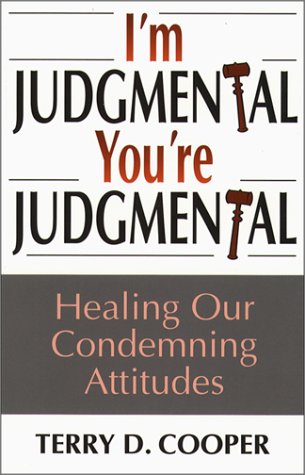Circumstance & Condition Does Not Define Anyone
Bias

Analogy Session
Recently, a few words have been tumbling around in my mind. Not only have I been examining these words and ideas, but much of what I was understanding in analyzing them was further cemented by some ideas my pastor put forth a few days ago about judgment.
It always amazes me how God ties things together. I say this because Dr.Tony Evans also stepped into the analogy session God and I were having, by means of his book, Free At Last; and threw some ideas into the pot. He was bringing up some scriptural references, and making some analogies that just happened to tie in and work within the scope of what God was already giving me.
The first contributor that set a few of the ideas in my head to analyze, was Mary J. Blige. That might surprise some, but I happened to be watching the BET Lifetime Achievement Awards a while ago. When they began to show the clips on Mary, one of the scenes was in a school or recreation center that was setup like a classroom. Mary was sitting there talking to some young teenaged ladies, and telling them, “Your circumstances do not define you.”
Are You A Writer?
If you are interested in making money online while writing? Hubpages is a great community to write in!
Condition
When I began, a day or two ago, to reflect back on this, I couldn’t be sure if she had said “circumstances” or “condition.” So in thinking on this, I wanted to know the difference, because I was analyzing the basis of people’s judgmental attitudes, and in sizing someone up, many people use either of these situational words to make their judgment of that person.
There were several definitions of the word “condition” that I found relevance in. I did look these words up on dictionary.com, but I am utilizing specific sections of the definitions I found to make some points.
A condition can be either a particular mode of being, a state of health, fit or necessary state (of being), or a social position. This was the first view I looked at, because I was thinking about how people judge others based on superficial things, like the car they drive, the clothes they wear, and their lifestyle.
I have to catch myself with this as well as anyone else, but I think I’ve gotten a little better at not reacting that way. That’s not to say I don’t size people up, and this is why I was checking out other words like “assess,” which means to estimate officially the value of, or to fix or determine the amount of something; to estimate or judge the value, or character. It also means to impose a tax or other charge on.
I found all of this interesting because isn’t that what we do? I really don’t think most of this definition was intended to be about people, but here I was trying to understand the difference between assessing, ascertaining, and judging, because I was thinking of a type of evaluating that is necessary to distinguish between someone that is beneficial to associate with, versus someone who clearly is not, and may potentially pose a threat to you in some way. This type of assessment is called discerning.
Confidence
The word “ascertain,” means to find out definitely; learn with certainty or assurance; determine: to ascertain the facts; to make certain, clear, or definitely known. It incorporates discovery with certainty, as through examination or experimentation.
It also involves being definite and precise, to cause to feel certain; to make confident; to assure; to apprise. It means to free from obscurity, doubt, or change; to make sure of; to fix; to determine. This I think, is the defining point between these words.
If we look at just the synonyms of the word judge, the difference in definition is clear. A judge is a representative of justice, an arbitrator, a referee, and an umpire who is entrusted with decisions affecting others.
Judge, in its legal and other uses, implies particularly that one has qualifications and authority for giving decisions in matters at issue: a judge appointed to the Supreme Court; a judge in the pie competition.
Likewise, in other forums, a referee usually examines and reports on the merits of a case as an aid to a court. An umpire gives the final ruling when arbitrators of a case disagree. They determine, consider, and regard facts that are in evidence, and adjudicate accordingly.
When we judge others, what ideology of “justice” are we serving? Who or what are we “entrusted” to protect? Are we fashion police with the unfathomable responsibility of making sure everyone is up-to-date with the most current fad? Are we gurus of world fitness, who must regulate the nutrition, health and body mass of the universal community at large? (No pun intended.)
My point is that a judge is someone with authority, appointed and entrusted with justice. Who are we to think we have the market cornered on what justice is?
Are We Qualified To Judge?

Assessors Not Judges
Now, I was distinguishing the difference between judgment and assessment or discerning. However, I keep coming back in my mind to perspective and the ground versus the aerial viewpoint. You see, the difference between a bonifide judge and you and I, is that a judge assesses the information by means of factual evidence; having a viewpoint and perspective outside of themselves; and then ascertains based on certainty, because they have the facts, and then their judgment is made.
This is the difference. We can only assess. We skip a step, because we cannot ascertain with confidence due to not having all the facts, but just basic information that we can assess with our eyes only. This means we only have the limited ground view, which involves more or less, immediate peripheral vision and therefore, can only determine a minimal amount about the person, or situation. The only other information most of us have is gossip, which is not free from obscurity in the face of actual facts.
We are simply assessors, yet somehow we think this is enough to give us temporary status as judges of others. What is it that has “conditioned” us into believing that we have this right; or that, in the grand scheme of things, any of what we assess is truly that important? I mean, if we were to assess from the air what we assess and judge from the ground, it would put a whole new spin on things.
Condition vs Circumstance
First of all, we’d realize just how small we all are, and certainly how petty. I think, however, that the rest of the definition of the word “condition,” will help explain why we assessors tend to overstep our bounds into the seat of judgment.
A condition is also that on which something else is contingent, to condition oneself, or to determine, limit, or restrict. Lastly, a condition can be viewed in legal terms, such as existing circumstances or a law, as in a stipulation in an agreement or a requirement imposed. This word can also mean to subject to particular conditions or circumstances, or to test (a commodity) to ascertain its condition.
Well, first let’s recognize that as assessors, we are not in a position to “test” for the purposes of ascertaining any certainties. Most judgments are more immediate, and based off of a reaction, versus a response, because a response is more of a well thought out determination or action, and involves a bit more time.
The difference between “condition” and “circumstance” is that a circumstance is a condition, detail, part, or attribute, with respect to time, place, manner, agent, etc., that accompanies, determines, or modifies a fact or event. It is a modifying or influencing factor; the existing conditions or state of affairs surrounding and affecting an agent.
One’s circumstance can contain their condition, but at the same time, one’s condition can be dictated by their circumstance, because their condition can be regulated by their perception and how they react or cope with their circumstance. One’s circumstance does not define them because we have no control of factors that can influence us. The only thing we can control about that is how we react or respond to those influencing factors.
So whether Mary said “circumstance” or “condition,” either one applies. We are not defined by the sum of our condition or circumstance, because both are based on multiple variables and we have no control of any of them; including the fact that they are subjective, ever-changing, and held captive by the limitations of time.
We are defined by the fulfillment of our individual God-given purpose on this earth, and how well we showed real love to God’s creation: to each other.









